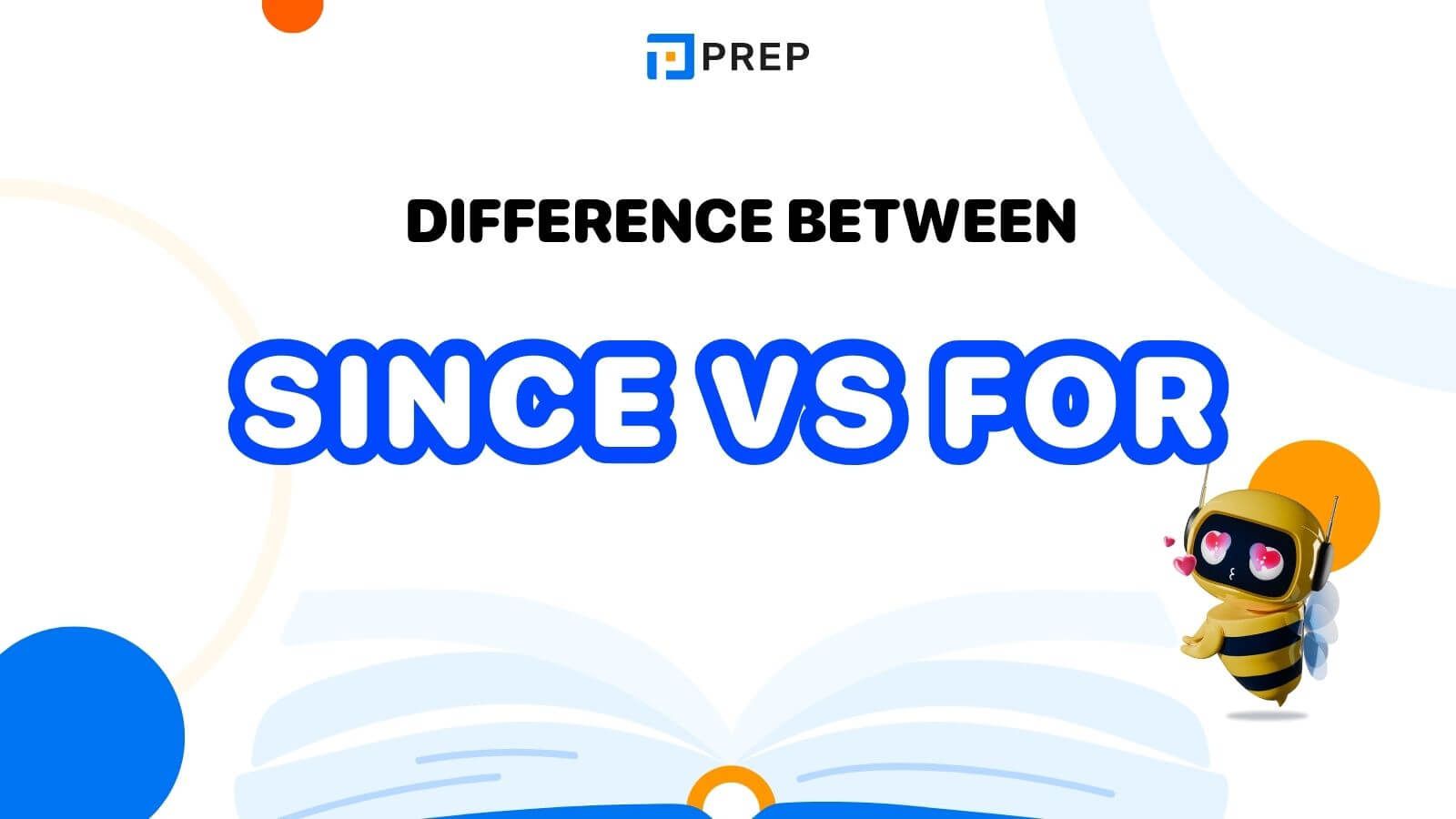Search blog
Since and For: What Are They? General Knowledge about For and Since in English
"Since" and "for" are two commonly used words in English. However, many people still confuse how to use them, especially in the present perfect tense. So, how are "since" and "for" used? When should you use "since"? When should you use "for"? Let's explore in detail the structures and uses of "for" and "since" in this article!

I. What is Since?
"Since" (/sɪns/) can function as an adverb, a preposition, or a conjunction, and it has the following meanings:
-
As an adverb: It indicates a specific point in time, often referring to the past up until now. For example:
-
Since he graduated, Kavin has been working as a teacher.
-
Since the accident, Bella has been afraid of driving.
-
She went for a run on Monday and has not been seen since.
-
-
Since also functions as a conjunction (though less commonly), meaning "because" or "as." For example:
-
I couldn't go to the interview since I was sick.
-
Since he loves to cook, he often invites friends over for dinner.
-
Some synonyms or phrases similar in meaning to "since":
|
Word/Phrase |
Meaning |
Example |
|
date from |
to have existed since a particular time; to originate at a certain time. |
Her interest in gardening dates from her childhood. |
|
all along the line |
in every part or aspect; throughout the entire extent or duration of a situation. |
I've supported her all along the line. |
|
date back
|
to have existed since a particular time in the past; often used with nouns. |
This habit dates back ten years. |
|
from then on |
from that time onwards; starting at a particular point in time and continuing into the future. |
From then on, I decided to change my life and work. |
|
thenceforth
|
from that time onward; used in more formal or archaic contexts. |
She had a terrible accident and thenceforth, she was afraid of driving. |
II. What is For?
"For" (/fɔːr/) is used as a preposition and conjunction, indicating a point in time.
When functioning as a preposition, "for" is used with the following meanings:
-
During (a period of time). For example:
-
I've been waiting for success for two years.
-
She has lived in Singapore for three years.
-
-
As for; regarding; intended for. For example:
-
As for me, I prefer learning English to German.
-
It's a good book for children.
-
-
In place of. For example:
-
You can use this pen for that one.
-
We can substitute butter for margarine in this recipe.
-
-
Although. For example:
-
For all his faults, he's a good staff.
-
For all the noise, they were still discussing.
-
When used as a conjunction, "for" means "because."
-
I'm so tired, for I stayed up late last night.
-
We can't go out, for it's storm.
Some synonyms or phrases similar in meaning to "for":
|
Word/Phrase |
Meaning |
Example |
|
To |
Indicates purpose or intent; regarding. |
I bought a notebook to take notes. |
|
During |
Refers to a period of time in which something happens. |
She slept during the movie. |
|
Due to |
Indicates a reason; because of. |
The concert of Lisa was cancelled due to the rain. |
|
On behalf of |
Represents someone else; as a representative for someone. |
On behalf of my team, I propose that we approve this plan. |
|
As for |
Regarding; concerning; in relation to. |
As for the budget, we still need to discuss it further. |
II. The Structures of Since and For in English
1. Since
"Since" is used to describe the point in time when an event or action begins to occur. Typically, "since" answers the question "When?" and is often used in perfect tenses.
Structure:
Since + point in time
For example:
-
I haven't seen her since we graduated from high school.
-
He has been living in Sydney city since 2010.
-
Since their wedding day, they have traveled to over 10 countries.
In addition, "since" can be used to indicate the reason or cause of an event or action. Typically, "since" answers the question "Why?" and is often used in sentences to explain the reason or context of a particular situation.
For example:
-
Since it's raining, we should stay indoors.
-
She didn’t attend the meeting since she was feeling unwell.
2. For
"For" is used to refer to a specific period during which an event or action occurs and lasts throughout that time. The difference between "since" and "for" is that the preposition "for" is used in almost all tenses and answers the question "How long?"
For example: For 7 days, for 4 years, for a long time…
Structure:
For + duration of time
For example:
-
We have been friends for over 10 years.
-
Kings Technology Joint Stock company has been operating in e-learning for over a decade.
Similar to "since," "for" can also mean "because." When used in this way, it is followed by a subordinate clause indicating the reason. The clause that contains "for" will follow the main clause and is separated from it by a comma.
For example:
-
She was excited about the trip, for she had always dreamed of visiting Paris.
-
They decided to postpone the meeting, for many team members were unavailable.
III. How to Use For and Since in English Tenses
Let's explore when to use "since" and "for," as well as how to use "since" and "for" in the present perfect, past perfect, and continuous tenses below!
1. Since
|
The usage of Since |
Example |
|
Present perfect tense |
|
|
Present perfect progressive tense |
|
|
Past perfect tense |
|
|
Past perfect progressive tense |
|
|
Since there/ since then/ ever since |
|
2. For
Tiếp theo, chúng mình sẽ đến với kiến thức về cách dùng For để phân biệt được cách dùng Since và For nhé:
|
The usage of For |
Example |
|
Present simple tense |
|
|
Present perfect tense |
|
|
Present perfect progressive tense |
|
|
Past perfect tense |
|
|
Future simple tense |
|
IV. Distinguishing Between Since and For in English
To help you clearly differentiate the uses of "since" and "for," let's take a look at the detailed table below!
|
Distinguishing Between Since and For in English |
||
|
|
Since |
For |
|
Similarities |
Used in sentences to express the time when an event/action occurs. It can also indicate the cause of an action.
|
|
|
Differences |
|
|
|
Example |
|
|
V. Exercises on Since and For
To apply the theory of using "for" and "since" in English, let’s work on some exercises together!
Exercise 1: Fill in the blanks with Since/ For
-
Jenny has lived in Nice _____ 2003.
-
John has lived in Lyon _____ 2 years.
-
Jessica has been sitting here _____ 2 hours.
-
Tom has been looking for a job _____ he left school.
-
Mina hasn’t been to a party _____ ages.
-
Susan hasn’t seen Anna _____ last week.
Exercise 2: Complete the sentences with Since/ For
-
How long has Bob been an architect? – He has been an architect _____ June.
-
How long has Steven known Alex? – Steven has known Alex _____ 1997.
-
How long has Min studied Chinese? – Min has studied Chinese _____ a month.
-
How long has Simon played chess? – Simon has played chess _____ a long time.
-
How long has Marabel played the ukulele? – Marabel has played the ukulele _____ secondary school.
-
How long has Agnes driven a racing car? – Agnes has driven a racing car _____ my birthday.
-
How long has Leo had his new house? – Leo has had his new house _____ last year.
Answer keys:
|
Exercise 1 |
Exercise 2 |
|
|
This article summarizes the entire knowledge of using "for" and "since," helping you to avoid confusion and use them correctly. Keep practicing with PREP to gain more interesting knowledge to confidently communicate in English and excel in your exams, Preppies!

Comment
Search blog
Đăng ký tư vấn lộ trình học
Bạn hãy để lại thông tin, Prep sẽ liên hệ tư vấn cho mình ngay nha!
